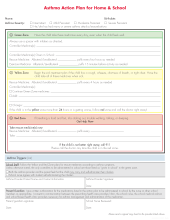Asthma: Wisconsin Initiatives
We work to improve asthma care and reduce disparities by supporting local organizations through funding and by providing resources and evaluation technical assistance.
Learn more about our asthma initiatives within health care and schools, and our initiatives that help patients manage their asthma.
The Asthma-Safe Homes Program provides free, in-home asthma education and home repair services to eligible families with poorly controlled asthma.
Our goal is to help Medicaid-eligible kids and expecting parents with asthma live their best lives by building asthma self-care skills and reducing home asthma triggers.
Quality improvement projects empower healthcare professionals to provide data-driven, standardized care to people with asthma.
Helping health care systems track and increase the use of asthma control tests
In partnership with the Wisconsin Collaborative for Healthcare Quality, we are helping healthcare systems track and increase the use of asthma control tests (ACT). Our participating organizations, providers and experts across the state are developing a measure that will track the number of patients with asthma who receive an ACT across systems.
Improving asthma identification, management, and outcomes
The American Lung Association Enhancing Asthma Care Program partners with clinics to strengthen their use of guidelines-based medical care by training health care providers to improve asthma identification, management, and outcomes among asthma patients.
We have proudly facilitated the recruitment of 40 Wisconsin clinics to date. This includes large health systems, federally qualified healthcare centers, and tribal clinics.
Training health care providers to manage environmental asthma triggers
We are working with the Children’s Health Alliance of Wisconsin, and the National Environmental Education Foundation to train health care providers in their Environmental Management of Pediatric Asthma Guidelines course. This training equips pediatric health care providers and other clinicians with knowledge and tools to manage environmental asthma triggers and provide intervention strategies.
Health outcomes improve when patients are given the tools they need to manage their asthma.
Educating people with asthma on effective medication use
In partnership with Hayat Pharmacy and the Pharmacy Society of Wisconsin, our program provides funding, resources, and evaluation for Medication Therapy Management (MTM). This service, provided by pharmacists, ensures the best therapeutic outcomes for patients with asthma. MTM includes five core elements:
- Medication therapy review
- A personal medication record
- A medication-related action plan, intervention, or referral
- Documentation
- Follow-up.
Pharmacists educate patients on types of asthma medications, appropriate medication administration, and environmental triggers.
Hayat Pharmacy provides MTM and medication synchronization in underserved areas of Milwaukee, and the Pharmacy Society of Wisconsin provides enhanced pharmacy services to Medicaid-eligible asthma patients in six accredited pharmacies in Brown, Kenosha, Racine, and Milwaukee counties.
Better Breathers Club
Better Breathers Clubs offer the opportunity to learn ways to better cope with chronic lung diseases while getting the support of others who share similar struggles. These support groups provide the tools needed to live the best quality of life. Better Breathers Clubs meet regularly and feature educational presentations on a wide range of relevant topics. Check out a club in your area:
Our work in schools helps ensure that kids with asthma have the care they need to be successful in the classroom.
School resources
The Wisconsin Department of Health Services receives funding from the CDC to administer the Wisconsin Asthma Program. CDC funding allows us to partner with the Children’s Health Alliance of Wisconsin to coordinate Wisconsin Asthma Coalition activities. Among children with asthma in Wisconsin, 34% reported one or more missed schools days because of their asthma. School staff are in a unique position to help coordinate care for students with asthma.
These resources assist schools in becoming more asthma-friendly and ensuring students who have asthma can achieve their academic potential and fully participate in all school activities.
Asthma action plan
An asthma action plan is a written, individualized worksheet that shows the steps to take to keep asthma from getting worse. It also provides guidance on when to call a health care provider or when to call 911. Use the School-based Asthma Management Program’s Asthma Action Plan as the official school form.
Highlights include:
- Twelve languages available.
- Open communication between the family, school, and clinician.
Asthma Action Plan for Home and School, Children's Health Alliance of Wisconsin
Clean school buses
With funding from the Bipartisan Infrastructure Law, the EPA Clean School Bus Program provides $5 billion over five years (FY 2022–2026) to replace existing school buses with zero-emission and clean school buses.
Highlights include:
- Replaced existing school buses with zero-emission and clean school buses.
- Reduced exposure to harmful diesel emissions.
- Reduced maintenance costs.
- Reduced fuel costs.
- Improved student attendance and academic achievement.
Improve air quality: Love My Air Wisconsin
Love My Air Wisconsin (LMA WI) is a school-based program that provides real-time air quality data to schools via a sensor. School staff and families can then use the data to make informed decisions about student exposure to poor air quality.
Highlights include:
- A customized air quality dashboard for schools and an app for family and community members to get real-time outdoor air quality updates.
- K-5th lesson plans that teachers can incorporate into their classrooms.
- An outdoor air quality activity guide to encourage kids to stay active and healthy.
- Asthma education and resources for school and families.
- Community outreach tools to uplift community knowledge and action.
- Support to implement outdoor air quality awareness campaigns.
School walkthrough program
The school and child care virtual and on-site environmental walkthrough program (Wisconsin Asthma Coalition) offers several ways to reduce asthma triggers in school. Children’s Health Alliance of Wisconsin staff will look at classroom environments, identify asthma triggers, and provide low or no-cost solutions to eliminate triggers.
Highlights include:
- Removal of common triggers found in the classroom like pet dander, pests, dust and dust mites, mold, mildew, and moisture.
- Participation at no cost.
A school nurse and asthma educator shared,
“With the help of the [Wisconsin Asthma Coalition] school walkthrough program, I was able to impact the lives of more than 1,400 students in our district living with asthma by learning how to identify common triggers and positively modify their learning environment. This program not only helped our students, but it also benefited our entire community by improving the air quality within our schools.”
Bronchodilator toolkit
Wisconsin Act 195 allows schools to stock bronchodilators. This act authorizes a public, private, or Tribal school to obtain, and to provide or administer, a short-acting bronchodilator to a student with a prescription, or to a person in respiratory distress.
Learn how to:
- Develop stock asthma medication policies.
- Administer stock, quick-relief asthma medication.
- Obtain quick-relief asthma medication and other supplies while addressing funding concerns and building awareness.
Staff asthma trainings
| Training | Length and format | Source |
|---|---|---|
| Asthma Basics: Learn more about asthma | 1-hour, online | American Lung Association |
| Asthma Educator Institute: Professional development course to provide asthma guidelines-based care to patients and their families and get the knowledge you need to sit for the National Asthma Educator Certificate exam. Registration fee required. | 3 half-day sessions, online | American Lung Association |
| Athletes and Asthma: Provides information to coaches and PE teachers to learn how to assist players of all ages who have asthma | 35-minutes, online | Minnesota Department of Health |
| Medication Delivery Device Instructions: Short videos providing instructions for various respiratory medication delivery devices | 2-minutes each, online | American Lung Association |
| Medication Delivery Device Training: In-depth training on how to use, instruct and clean various medication delivery devices. For more information, contact Cristine Rameker at 608-267-6845 or cristine.rameker@dhs.wisconsin.gov. | 60-minute, in-person | American Lung Association |
Student asthma trainings
| Training | Length and format | Source |
|---|---|---|
| Open Airways: This facilitation training will prepare you to educate and empower children with asthma, ages 8–11, on how to detect the warning signs of asthma, avoid triggers, and make decisions about their health. Registration fee required. | Five modules, online | American Lung Association |
| Kickin Asthma: This facilitation training will prepare you to educate and empower children with asthma, ages 11–16, on how to detect the warning signs of asthma, avoid triggers, and make decisions about their health. Registration fee required. | Four modules, online | American Lung Association |
EXHALE guide for schools
EXHALE is a set of six strategies that each contribute to better asthma control. Schools can use EXHALE to help students with asthma achieve better health.
E: Education on asthma self-management
X: Extinguishing smoking and exposure to secondhand smoke
H: Home visits for trigger reduction and asthma self-management education
A: Achievement of guidelines-based medical management
L: Linkages and coordination of care across settings
E: Environmental policies or best practices to reduce asthma triggers from indoor, outdoor, or occupational sources.
Highlights include:
- EXHALE strategies can reduce asthma-related missed school days.
- Each strategy can reduce asthma-related ED visits and hospitalizations.
EXHALE: Strategies to Help People with Asthma Breathe Easier
Creating asthma-friendly schools with mini grant opportunities
Our mini grants help school districts implement asthma management programs that help kids stay healthy, learn better, and fully participate in the school day. The grants include evidence-based staff education, a school walkthrough, and assistance ensuring all students with asthma have an asthma management plan on file.
Current grant opportunities
The American Lung Association is offering a mini-grant opportunity to assess schools' indoor air quality and develop an Energy Efficient Indoor Air Quality Management Plan:
What
Develop or implement comprehensive Energy Efficient Indoor Air Quality Management Plans
Who
Any K-12 school can apply
Funding amount
Three levels of mini-grants are available. Schools may apply for any or all levels:
- Assess mini-grant: Schools may apply for up to $2,500 to conduct assessments of their school for indoor air quality and energy management. Up to 10 schools within a district can receive Assess funding for a total of $25,000 per district.
- Plan mini-grant: Schools may apply for up to $3,000 for Energy Efficient Indoor Air Quality Management Plan development. Up to 10 schools within a district can receive Plan funding for a total of $30,000 per district. Schools must complete and submit a completed IAQ assessment to be eligible for a Plan mini-grant.
- Act mini-grant: Schools may apply for up to $4,000 for Plan implementation. Up to 10 schools within a district can receive Act funding for a total of $40,000 per district. Schools must complete and submit an IAQ assessment and Energy Efficient Indoor Air Quality Management Plan to be eligible for an Act mini-grant.
Project period
Schools have six months from signing the MOU to complete the Assessment and Planning Mini-grants, and Schools have 12 months from signing the MOU to complete the Implementation Mini-grant.
Application due
Mini-grant applications are accepted on a rolling basis, until all mini-grants are awarded (Mini-grants will be awarded to approximately 800 schools nationwide between July 2025 and December 2028). Applications will be reviewed every other month of each year starting July 1, 2025 (i.e., July 1, September 1, November 1, January 1, March 1, May 1 of each year). Decisions will be made, and schools will be contacted by email by the 15th of the month of the review.
Posting
What else
Learn more on the American Lung Association website.







